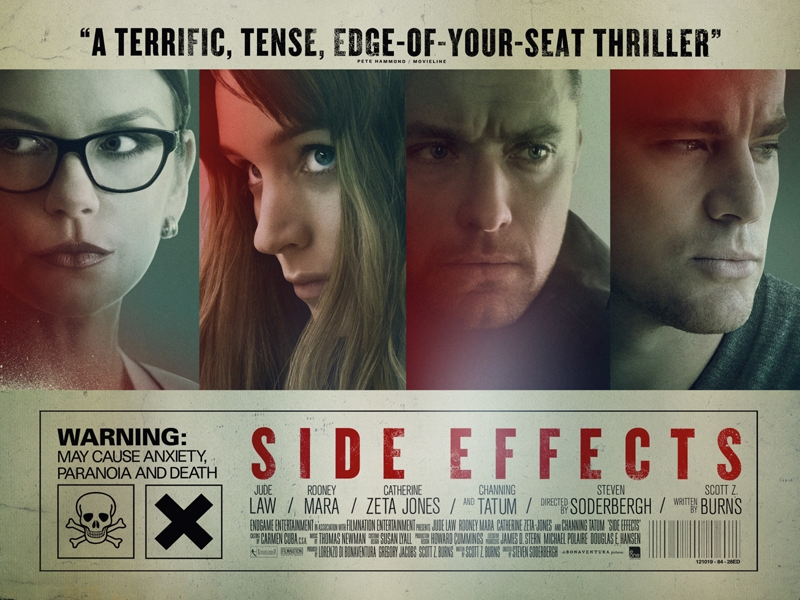This film starts off pretentious, covering bases already covered in tons of previous flicks, then takes a right turn and morphs into a nasty good thriller.
Genre: Thriller
Premise: After her husband is released from jail for insider trading, a young woman is prescribed a new medication to treat her anxiety. However, the pill ends up having some seriously dangerous side effects.
About: Back in 2011, Steven Soderbergh was putting together a movie with Warner Brothers called “Man from U.N.C.L.E.” When they wouldn’t get him the budget he wanted, though, he took his writer, Scott Burns, and came up with Side Effects, a script previously titled, “The Bitter Pill.” Burns scripted a couple of other Soderbergh films – “The Informant!” And “Contagion.” Side Effects came out this weekend and stars Jude Law, Channing Tatum, Rooney Mara, and Catherine Zeta-Jones.
Writer: Scott Z. Burns
Details: Movie was 106 minutes. November 22, 2011 draft was 123 pages.
I keep hearing that Steven Soderbergh is going to retire, yet I keep seeing Steven Soderbergh movies whenever I go to Fandango.com. Haywire. Magic Mike. Now Side Effects. Haven’t those all come out in the last year alone? If Soderbergh’s so sick of directing, why is he directing more movies than anyone in Hollywood?
Soderbergh’s kind of a bizarre director anyway. Here’s my main beef with him. He never stokes the fire in his movies. He always keeps a nice steady burn, enough for you to stay warm, but he never burns you. He never turns up the heat all the way. For that reason I always leave his films feeling unsatisfied. Bubble is the perfect example. Nothing that dramatic happens in the movie. It just kind of keeps your hands warm. I suppose some people like that but I’m not one of them. I need things to HAPPEN in my movies. I need plot points with some weight, twists with some edge, I need moments that burn you.
What irks me about Soderbergh is that he seems to think his unique approach to filmmaking makes up for this. He was one of the first guys to start using hand held all the time. He’ll shoot movies in black and white. He’ll cut scenes with dialogue that’s laid over from other scenes. To me, these are distractions. You can argue that they spice up the viewing experience, but in my opinion, if you tell a good story, you don’t need all these little tricks.
Emily Taylor’s had a tough few years. Her husband, who she’d been sharing the Manhattan high life with, was thrown into jail for insider trading. She stood by his side during his incarceration, but now that he’s out, she realizes that she’ll never have the same life again. They’re going to be living in a 1000 square foot apartment instead of the 10,000 square foot one. They’re going to be eating at home instead of at the Gramercy Tavern. True, it still ain’t that bad, but when you’ve been to the top, falling back to earth can be devastating, and that’s where Jonathan Banks (Jude Law) comes in.
Emily is referred to Jonathan for her anxiety and depression. He prescribes her a new medication called Ablixa. The pill does wonders, improving her sex life, improving her mood, improving her energy. It’s like a 180 degree turnaround. But it does have some side effects, the worst of which puts Emily in a zombified state. She’ll wake up at weird times during the night and make dinner. Or she’ll stare off into nowhere for extended periods of time.
The side effects are annoying but ultimately harmless, so when Emily begs to stay on the pill, Jonathan reluctantly allows it. That turns out to be a not-so-good call though because (major spoiler) a few nights later Emily stabs and kills her husband while sleepwalking. Uh-oh.
At first this appears to be an open-and-shut case, but as the lawyers and media swarm in, Emily begins to get painted as a victim of the U.S.’s over-dependence on prescription pills. It’s the medication that made her sleepwalk, that was responsible for her husband’s death, not her. And, of course, this puts Jonathan front and center in the media spotlight. Why did he prescribe her this pill for which so little was known? Why did he continue to allow her to use it despite the excessive sleepwalking side effects?
Pretty soon Jonathan is losing his sponsors, losing his colleagues, losing his wife and in danger of losing his job. Desperate to get his reputation back, he contacts Emily’s old doctor, Victoria Siebert (Catherine Zeta-Jones) to get more info on Emily. (major spoilers) Victoria paints Emily as your average depressed young woman, but the talk inspires Jonathan to look deeper. And what he finds, surprisingly, are some inconsistencies in Emily’s story. One of her supposed best friends at work doesn’t seem to exist. And an earlier suicide attempt in her car was prefaced by her putting on her seatbelt.
Could it be – gasp – that Emily deliberately killed her husband? Could it be she planned all this from the beginning, the fake side effects, the fake sleepwalking, in order to get away with murder? And how come Victoria made a huge stock bet that Ablixa would tumble mere days before the murder, ensuring she’d get a ton of cash if the stock tanked? Jonathan’s asking all these questions, but not getting simple answers. Is he so desperate to get his life back that he’s no longer able to see reality? The answer to that question will determine the rest of his life.
There are a couple of ways you can take a story like this. You can go the debate route or the dramatic route. The debate route is where you tackle all sides of the debate – essentially whatever your theme is. So here the theme appears to be, “Who’s really responsible for a side-effect related drug accident?” Is it the person taking the drug? Is it their doctor? Is it the makers of the drug?
I HATE debate-oriented screenplays. Actually, let me take that back. I hate when the debate is the ONLY THING GOING ON IN THE STORY. Ignore drama. Ignore story. Just debate an issue that has no obvious answer. It’s been awhile since I saw it, but I remember Syriana to be like that. It was less about a story and more about debating who’s responsible for fighting oil-motivated wars. Screw that. I want a story. I want clear villains to emerge. I want the people responsible for bad shit happening to go down. I don’t wanna feel like we’re just here to talk about the issue. Cause I can do that with my friends. When I go to a movie, I want to be entertained.
(spoiler) Which is why I was sooooo happy when Jonathan started suspecting Emily was lying – when we found out she put her seatbelt on before trying to kill herself, when he started catching her in little lies – It’s then when I sat up and said, “Oh my God, she murdered her husband on purpose!” Gone were the debates, replaced by good old-fashioned DRAMA. A goal arises (Jonathan has to prove Emily killed her husband). Obstacles arise (he loses his family, his job, people try to stop him). Reversals occur (we thought Victoria was good. Turns out she’s in on it). I understand there’s a certain “adult-ness” and sophistication to watching a movie that simply debates an issue. But fuck that. If I’m paying 15 bucks, I want interesting shit to happen.
Something else that popped out at me was how each of the three major roles allowed the actors to play two completely different types. Jude Law starts off playing a normal helpful engaging psychiatrist. Then later, he’s a wild crazed desperate man. Rooney Mara starts off playing this dazed depressed victim sleepwalking through life. She then turns into an evil cunning man-eater. Catherine Zeta-Jones starts off as a straight-laced respected doctor, then turns into a backstabbing cold conspirator. You HAVE to think about this stuff when writing your script. It’s how you get good actors attached. Actors mean financing and financing means your movie gets made.
Another thing I noticed was that we switch protagonists midway through the story (talk about a midpoint shift!). Rooney Mara (Emily) is our main character when we begin. She’s the one dealing with her husband being released from jail. She’s the one seeking help. She’s the one we’re focusing on in relation to the medication. However, after the murder, the script moves over to focus on Jude Law’s character (Jonathan). It was done startlingly naturally, so much so that you barely noticed it. But don’t let that fool you into thinking it’s easy to pull off.
From a story perspective, it was necessary. That’s because once Emily goes to jail, there’s no need to stay with her anymore. Everything interesting about her character from this point on is a secret (that she’s faking this). It’s more dramatically compelling, then, to switch over to Jonathan, who’s experiencing a free-fall in his profession, something that’s way more interesting to watch than a girl sitting in a jail cell. So that was a clever little move by Burns, yet still something I would avoid unless you’ve written 20+ scripts. I’ve seen amateur writers try to do something similar and the result is random as hell. We’re sitting there going, “Why are we watching this other character now? I don’t understand.” Burns worked Jonathan into the story bit by bit, increasing his presence as we approached the midpoint, so that by the time Emily went to jail, we knew Jonathan well enough to let him take the reins.
That just proved how skillfully Side Effects was written. I don’t know if anyone’s going to remember it later in the year, but it’s a strong film that’s worth seeing. The only real issue I had with it was that it oozed this depressing tone. You don’t feel good when you leave the theater afterwards. It takes something out of you. Either way, it’s the best script Soderbergh’s had to work with in awhile. That alone should be reason to check it out.
[ ] what the hell did I just see?
[ ] should’ve gone to In and Out instead
[xx] worth the price of admission
[ ] impressive
[ ] genius
What I learned: YOU NEED CHARACTERS THAT ALLOW ACTORS TO SHOW THEIR RANGE. Make sure they get to play at least two different types, like Side Effects does.



